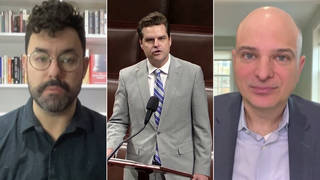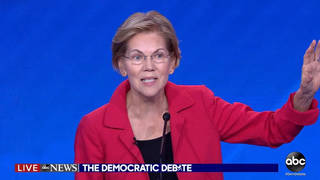
Related
Topics
Guests
- Elizabeth WarrenHarvard Law School professor and bankruptcy expert. She chairs the Congressional Oversight Panel over the bank bailout.
As a battle rages behind the scenes over who will head the newly created Consumer Financial Protection Bureau, we play a speech by bailout watchdog Elizabeth Warren, who has emerged as a frontrunner for the position. [includes rush transcript]
Transcript
AMY GOODMAN: Harvard Law School professor, bankruptcy expert, Elizabeth Warren, is frontrunner to lead the newly created Consumer Financial Protection Bureau. The bureau’s director will be the most powerful new banking regulator in decades and the first with the exclusive mission of focusing on consumers. She chaired the Congressional Oversight Panel over the bank bailout and is an outspoken consumer advocate.
Big banks are strongly opposed to Warren’s nomination. According to a New York Times editorial from earlier this summer, quote, “The banks don’t oppose Ms. Warren because she doesn’t get it. They oppose her because she does.”
Well, the idea for an independent federal agency to protect ordinary borrowers from abuses by lenders was largely her idea, based on an article she wrote three years ago. In July, Congress made her idea a reality as part of the financial reform legislation.
Elizabeth Warren addressed an enthusiastic crowd at the Netroots Nation convention in Las Vegas earlier this summer. This is a part of what she said.
ELIZABETH WARREN: I thought of four things that we should think about as we begin to build a new bureau. The first one is: It must stand for families. We’ve had long enough where there’s been no one to stand for families. Now, what does that mean? It means, in part, in the case of the credit agreements that we’ve been talking about, a level playing field again. It means that there’s someone there to make sure that both families and lenders understand the terms of the credit agreement; that it is as obvious to one side as the other; that when they come together, they get what this transaction is, the cost; that we create competitive markets so that the products are products that not only are priced so that consumers can understand them, but they’re priced well in the marketplace.
But it also means something else to stand on behalf of families. When folks — when powerful people get together in our government, and they start to divide up where things are going to go, when they start to make decisions about who’s going to be helped and who’s not going to be helped, there needs to be at least one person in the room who asks the question, how will this affect America’s families? Not just how will it affect America’s banks, not just how will it affect America’s businesses, but how will it affect America’s families? One of the things this bureau can do is be there on behalf of American families.
Now, the second thing that I think is really critical about this agency is it must be reality-based. It’s not good enough to have a great theory. And frankly, it’s not good enough to have just a good heart. It’s got to be grounded in how things really work on the ground. And I’m going to give you an example of that. Small banks. If the consequence of this agency is to put in enough new bureaucratic obligations that it crushes community banks, then the agency will not have been successful. If the community banks are driven out of business, that creates more concentration in the banking industry. The big get bigger, and the small go away. But it also means there are fewer of those banks around to lend to the small businesses that we’re counting on to restart this economy. And it means that families themselves have fewer choices between small banks and big banks. And that’s a choice we’ve got to preserve. So, ultimately, what this agency has to be about is, yes, the first one on the side of the families, but second, the side of creating workable, realistic markets, sustainable markets, over time — markets that work for consumers, but that also create a viable functioning credit system. It’s got to be part of what goes into this.
Third part is the agency — the bureau. The bureau has to be able to grow and change. You know, part of what went wrong in the 1930s was that we didn’t keep the rules up to date. The world changed around it. The markets changed around it. How families behaved changed around it. But the rules were not changing. They were not vital. And so, what this agency — what we have to think about when you’re building in at the beginning is, how do you build change? How do you build some creative destruction into the agency itself? You know, I come from the world of bankruptcy. It’s what I teach. Bankruptcy is littered with the businesses that didn’t adapt to the world. Government doesn’t have that same discipline in it. And so, part of building this agency is building in how it will change and adapt over time, that it has the right structure to do that.
And then the last part I want to mention is part of why I’m here today. This will be the first agency we have built in a wired world. Think about that for just one minute. The relationship between government agencies, between bureaucracy, between the government and its people, at the time we built all of the earlier agencies, was one of — the government labors relative obscurity, and you send out some information, and people get it through their newspapers or watching television or radio or whatever they listen to. This is an agency that will be the first to be born digital. It will be an agency that can send from — it will have the capacity to communicate with millions of Americans by just hitting a send button. It will also be an agency where millions of Americans have the capacity to communicate with the agency by hitting a send button. And the possibilities here are endless. The notion that part of how one comes to understand and define the problems in the credit area will change if we hear — if this agency hears, if this bureau hears from people who are experiencing it. This is part of its — it can be built into the research function of the agency. If the agency can hear from people and communicate with people, it changes the concept of how regulations work, of how regulations are tested, of how regulations are communicated and how they are enforced. So, I think of this as a real opportunity as we build this agency, not to replicate what was built last time, when we had a consumer agency in the 1970s, but to try a whole new model, to think about this agency from a different perspective.
So, that’s why I came here today. I bought a plane ticket and showed up here, because I have a specific “ask.” I wanted to talk to people who have a voice, and that’s why I came to talk to you. There are three things I want to ask you to do with your voice. I want to ask you to use your voice on behalf of economic security for middle-class Americans. In a world in which so many people face so much insecurity, I want you to give them voice. I also want to ask you to use your voice for ideas. This is the place to let ideas be born, to let them bounce around, to let them get tougher, to let the bad ones die out and the good ones advance. This is where ideas should come from. And the third is, I want to ask you to use your voice as a voice of conscience, in a world that sorely needs more conscience. You are our collective conversation on conscience.
So, I’m going to wrap this up by saying we have an opportunity now to pick up the tools that were laid out in this new Consumer Financial Protection Bureau. And, look, unused tools don’t do anyone any good. The point is to pick them up and use them. And it’s going to be tough. The era of my grandmother in the Great Depression, it was tough then. Remember, Franklin Roosevelt faced his economic royalists. Remember, it took him years to get his entire economic package into place. It paid off. It was tough, but it paid off. So what I want to think about is what we do from this moment going forward. If you have any doubts about where we’re headed and how much change we can make, I ask you for just one second to glance back over your shoulder at where we have traveled over the last year. I was in Chairman Barney Frank’s office just a few weeks ago, and Barney Frank deserves as much credit as anyone on this planet for keeping this Consumer Financial Protection Bureau and making it strong. So, Chairman Frank and I were talking about some details about the bureau and what might happen and not in conference. And we got to the end, and Barney looked up in that way he does, you know, over the top of his glasses, and he growled, because that’s the only way I know to describe a conversation with Barney. He’s like, “You know, Elizabeth, a year ago, this idea wouldn’t have even qualified as a pipe dream. And here we are.”
And here’s the best part of it, when you’re thinking about what we can do. We’re not here today because the banks gave it to us. The banks did not, a year ago, say, “Well, we’re really sorry we broke the economy. And we really appreciate that you put $700 billion and a few trillion in guarantees on the table to help bail us out. And, therefore, we’re going to support some regulation for ordinary families to kind of level the playing field and just make sure that everybody’s getting a fair deal here, that you can read your credit card contracts and mortgage agreements.” They didn’t say that. They fought us every single inch of the way. They announced in August of last year that the consumer agency was dead. And why was it dead? Because they were going to kill it. They were quoted in the New York Times. They were that sure of themselves. The lobbyists came out and said, “We will kill the consumer agency.” And they announced it, and they re-announced it, and they re-announced it. They also announced its death over and over and over. If you check the papers, it was the agency was still dead as of February of this year. But we didn’t give up. We scratched, and we bit, and we hung on, and we didn’t give up. And today, here’s where we are, with a good, strong set of tools to change the consumer market.
So let me wrap this back around. Is this going to save the middle class by itself, the consumer agency? I’ve written about the middle class now for two decades. And if you want to give me another couple of hours, I could bend your ear about all that’s happened here. And the answer is no. There’s frankly too much that’s broken. We’ve got to have change in labor policy. We’ve got to have change in health policy. We’ve got to have changes in education policy. That’s what it will take to restore a middle class. But we also have to have changes in consumer credit policy. And the new bill is a big step in that direction. So, here’s what I want to say. One way or another, I’ll keep pushing for the middle class. I hope you will, too. Thank you. Thank you.
AMY GOODMAN: Harvard Law professor Elizabeth Warren, chair of the Congressional Oversight Panel that oversees the bank bailout and an outspoken consumer advocate. She was speaking at the Netroots Nation conference.












Media Options